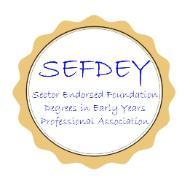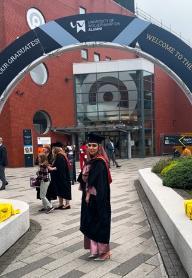95% of students happy with the teaching on the course.
NSS,2024
The course is suitable for people new to this area or experienced staff seeking career development.
The linking of theory and practice is integral throughout the degree, and you will undertake placements to gain work-based experiences with babies and young children. This will allow you to consider theory about the implications for practice so you can evaluate and develop creative approaches to working with babies and young children. You will also develop the skills of critical reflection and appraisal, which will enable you to understand and consider ethical principles, child development, children’s rights, health and wellbeing, child protection and safeguarding, early years pedagogy, multi-agency working and disability, diversity, and inclusion.
The Early Childhood Studies degree at the University of Wolverhampton offers you a choice of pathways:
- Early Childhood studies with Assessed Practice (Level 3 full and relevant equivalent). Completion of the placement aspect of the degree includes the award of a level 3 Early Years Educator.
- Early Childhood Studies with Assessed Practice (Graduate Practitioner Competencies)
- Early Childhood Studies Top Up for further Level 6 education
The Graduate Practitioner Competencies are a proactive approach to shape the identity of the early childhood workforce and strengthen the professional practice aspect of the Early Childhood Studies degree. Graduate-level practice makes the distinction between level 3 and 6 practices explicit for practitioners and employers
The BA (Hons) Early Childhood is three years full-time course, and this course is also offered PART-TIME, which requires you to attend daytime sessions. However, if you are employed in Early Years and already have a level 3 qualification, we offer a part-time Foundation Degree in Early Years Services at our partner colleges. After completing your part-time foundation degree, you can then progress onto a final year of a part-time BA (Hons) Early Childhood Studies course in order to gain a full honours degree.
This degree sits within an exciting range of Early Childhood and Family Studies courses we offer within the School of Education.
We are members of The Early Childhood Studies Degree Network

We are sector-endorsed for our Foundation Degree in Early Years Services by SEFDEY.


/prod01/wlvacuk/media/departments/digital-content-and-communications/images-18-19/iStock-163641275.jpg)
/prod01/wlvacuk/media/departments/digital-content-and-communications/images-2024/250630-SciFest-1-group-photo-resized-800x450.png)
/prod01/wlvacuk/media/departments/digital-content-and-communications/images-18-19/210818-Iza-and-Mattia-Resized.jpg)
/prod01/wlvacuk/media/departments/digital-content-and-communications/images/Maria-Serria-(teaser-image).jpg)
/prod01/wlvacuk/media/departments/digital-content-and-communications/images-2024/241014-Cyber4ME-Project-Resized.jpg)
/prod01/wlvacuk/media/departments/digital-content-and-communications/images-18-19/210705-bric_LAND_ATTIC_v2_resized.jpg)
/prod01/channel_24/courses/media/images/2019-re-design/testimonials/Hajra-Khalid.jpg)


-Kizzy-Scott-278x371.jpeg)

